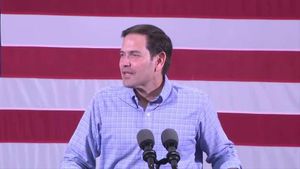India has expressed growing concern over the recent Free Trade Agreements (FTAs) signed by the Maldives with China and Türkiye, fearing these could threaten the island nation's fiscal stability. The Indian government has made it clear through its Ministry of External Affairs (MEA) spokesperson, Randhir Jaiswal, during a recent media briefing, indicating the need for India to reconsider its financial aid policy to the Maldives.
These agreements represent significant shifts for the Maldives, which saw President Mohamed Muizzu's administration revive the FT agreement with China, originally concluded back in 2017 under former President Abdulla Yameen but shelved shortly after the 2018 elections as the new government sought revisions. The resumption of the China-Maldives FTA began during Muizzu’s state visit to Beijing shortly after he took office on November 17, 2023. The agreement formally took effect on January 1, 2025, estimated to bolster trade between the two nations close to USD 1 billion.
Responding to inquiries about the potential economic ramifications of these agreements, Jaiswal highlighted the risk of revenue losses for the Maldivian government and its subsequent effects on the nation’s long-term fiscal integrity. He stated, "Recent agreements likely to result in revenue loss for the Maldives government are, obviously, a matter of concern and do not bode well for the long-term fiscal stability of the country," emphasizing India's vigilance over the circumstances as they evolve.
India’s concerns come on the heels of strengthened ties following Muizzu's turbulent electoral theme of promoting the 'India Out' campaign, which had strained relations between the two nations. High-level meetings over the past year have restored some level of diplomatic comfort, including Muizzu's October 2024 visit to India, where discussions centered around mutual support and development partnerships.
The recent FT agreements, especially with China, have renewed critiques from the Maldivian Democratic Party (MDP), the opposition, who argue the trade deal could deepen reliance on Chinese imports, as the Maldives imports around 95% of its necessities. MDP leaders have pointed to how the loss of import duty revenue could severely impact the economy.
Maldivian Minister of Economic Development, Mohamed Saeed, contended the concerns of revenue shortfall could be mitigated by alternative state earnings, presenting examples of how fiscal health could be maintained even as certain duties are eliminated. Skepticism persists, though, as many see heavy reliance on duty-free imports posing significant risks.
During the press briefing, India's Jaiswal also indicated New Delhi's proactive stance on maintaining close contact with Maldivian authorities. Addressing how it may reshape Indian financial policies, he reflected on the fundamental importance of economic stability, saying, "We remain in close touch with Maldivian authorities on the situation facing them."
With the Maldives now having visible ties with both China and Türkiye, which also signed its preferential trade agreement last November, India’s position could become more nuanced as it aspires to balance diplomatic and financial relations to counteract the growing influence of both countries.
Historical patterns of Maldives' governance indicate caution—a similar approach favored under former President Ibrahim Solih's government when trade relations with India were prioritized. But under President Muizzu, there is now evident momentum toward Chinese engagement, which has alarmed the Indian leadership.
This shifting reliance has serious financial bulletins. The World Bank's October 2024 economic review on the Maldives outlined serious concerns, flagging "heightened external and fiscal vulnerabilities" due to rising public debt and unmanageable fiscal expenses, spurred by new agreements like those with China and Türkiye.
Following the new developments, Indian PM Narendra Modi had reinforced India’s commitment to the Maldives amid attempts to solidify old ties, pledging financial aid avenues and indicative currency swap facilities, which total $760 million, available for immediate use to counteract economic woes.
The Maldives must navigate these complex foreign relationships delicately. It appears more than simply fulfilling popular nationalistic polices; it may fundamentally affect their economic shortfalls and long-term viability.
India's reactions could also indicate future diplomatic strategies to re-establish stability within its neighborhood. The Maldives' external debt crisis remains pivotal, and the successful navigation of international partnerships could possibly dictate the financial future of the nation.
Despite this turbulent backdrop, one fact remains clear—the Maldivian administration will need to carefully weigh immediate benefits of new trade relations against any long-term economic repercussions, especially with India taking notes and likely recalibrations of its support model for the nation looming on the horizon.



